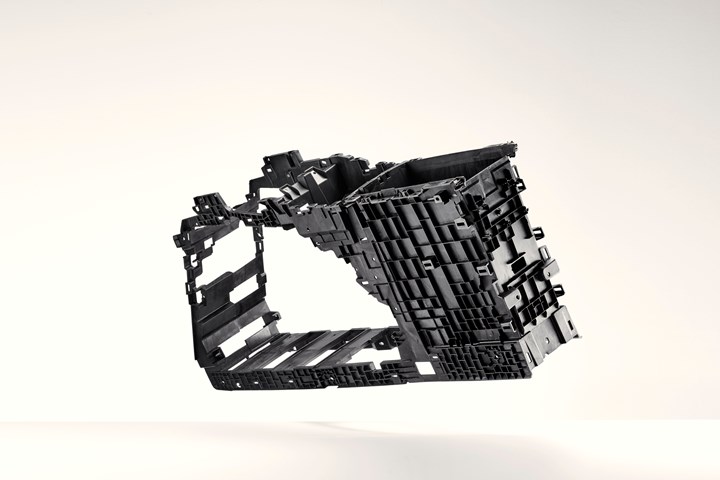Borealis highlights polypropylene technology for flexible automotive design
Fibremod, the customized carbon and glass fiber-reinforced polypropylene material ensures reduced weight, cost savings and design flexibility.

Center console automotive application using Fibremod. Photo Credit: Borealis
(Vienna, Austria), a supplier of polyolefin plastic materials for engineering applications in the automotive industry highlights the availability of Fibremod, its innovative carbon- and glass fiber-reinforced polypropylene (PP) technology, for the North American automotive market. The Fibremod family of customized products enables automotive manufacturers to achieve lighter weight and save on cost, says Borealis. Further, the company notes that replacing engineering plastics and metal parts with energy-efficient and lighter weight PP grades leads to improved fuel economy and lower CO2 emissions.
According to Borealis, products in the Fibremod family are a suitable material substitute for metal and engineered plastics, delivering unmatched design flexibility. Short-glass, long-glass and carbon fiber formulations are available, with customizable fiber content ratios, to enable manufacturers to balance strength, weight and cost according to specific design needs across applications ranging from front end and tailgate modules to instrument panel and center console carriers.
Fibremod products products also support energy efficiency in production by reducing process temperatures and energy requirements compared with alternative solutions such as polyamide (PA).
Related Content
-
Revisiting the OceanGate Titan disaster
A year has passed since the tragic loss of the Titan submersible that claimed the lives of five people. What lessons have been learned from the disaster?
-
The potential for thermoplastic composite nacelles
Collins Aerospace draws on global team, decades of experience to demonstrate large, curved AFP and welded structures for the next generation of aircraft.
-
Development of a composite liquid hydrogen tank for commercial aircraft
Netherlands consortium advances cryogenic composites testing, tank designs and manufacturing including AFP, hybrid winding, welding of tank components and integrated SHM and H2 sensors for demonstrators in 2025.



